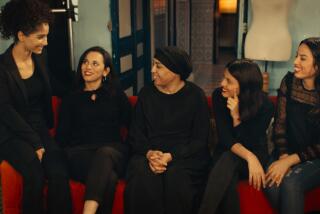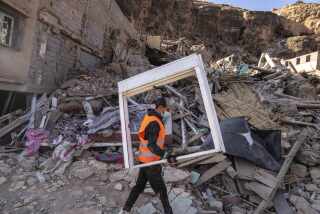Morocco’s Women Seek Solutions to Islam’s Ancient Disputes
- Share via
RABAT, Morocco — When Nabila Benkiran goes to the beach, she slips into a homespun waterproof tunic and pants--to keep her modesty intact and spare men any temptation.
Just a few decades ago even that would have been unthinkable. Religious and cultural taboos made beaches forbidden territory to the women of this Muslim nation. But mores have shifted with the changing times.
Today, women lounge on the white beaches of Morocco in tiny swimsuits, sit primly in ankle-length djellabas too cumbersome for swimming, or, like Nabila Benkiran, steal away for a swim in gear befitting their conservative Muslim beliefs.
The contrasts reflect the alternatives facing the world’s half-billion Muslim women, not just in clothing but in lifestyles.
In the land of Islam, stretching from Asia to this kingdom on Africa’s Atlantic coast, tradition, local custom and politics mix with religious credos to determine not only how women dress, but the role and status of women.
As modernization--invariably linked to Westernization--flouts borders and defies national agendas, women’s issues have emerged as a central theme.
“Women have become the center of the war, in a sense, between the two cultures,” says Yvonne Haddad of Georgetown University’s Center for Muslim-Christian Understanding. And the veil, she says, is like “the silk curtain . . . the divide between Islam and the West.”
In those countries where women can influence the agenda themselves, some seek a revival of back-to-basics Muslim values as set out in the Koran, the Muslim holy book. Others strive for an updated Islam that accords women rights synonymous with the West, from freely choosing a husband to gaining custody of children in a divorce.
Morocco, a former French colony and one of the most Westernized Muslim nations, is a microcosm of the growing debate. Like many Muslim states, it has been convulsed by the drive toward modernization, by economic need that has forced women into the workplace and by the breakdown of the extended family.
Morocco’s Princess Leilah set the official tone of modernity in 1947, delivering a speech in Tangier with her head uncovered. But 50 years later, Moroccan women remain minors under Muslim law.
Sometimes the debate over women’s role is played out at the point of a gun.
In neighboring Algeria, Islamic insurgents have slain young girls for failing to cover their heads. In Afghanistan, the Taliban religious militia has banned women from school and work and ordered their bodies covered from head to toe. Islamic militants in both countries condemn Western influences.
Such extremism toward women is the exception and, most Muslims would say, un-Islamic.
Muslims generally view Islam as a liberating force for women. They say the Prophet Muhammad, who Muslims believe received God’s revelations nearly 14 centuries ago, improved women’s lot.
“You cannot put the repression of women on the prophet,” says Moroccan sociologist Fatima Mernissi, an authority on women and Islam. “That guy liberated women.”
During the Jahaliya, the time of ignorance that Muslims say preceded Islam, women were sold or stolen and infant girls sometimes buried alive--practices decried in the Koran.
Through the revelations, Muhammad also conferred some autonomy on women, from the right to inheritance, even if half that of a man, to the right to ownership of property.
Still, in the Muslim world, women are the guardians of tradition and, above all, of man’s honor. Many believe that tampering with their role, status or attire risks rocking the edifice of Islam--both a religion and a way of life.
*
“My parents aren’t very good Muslims,” says the devout Benkiran, who covers herself so carefully at the beach. Neither of her parents, both educated in Europe, prays regularly. In a further departure from Islamic norms, her father, she says, sometimes drinks.
Taking the veil at 16, Benkiran was at the forefront of an Islamic revival that began in the early 1970s and gained impetus from Iran’s Islamic revolution in 1979.
“I had a big battle with my family,” she says. “They almost put me in a psychiatric hospital.
“Why is the veil considered submission? I had to revolt to be able to wear it.”
For some pious women, wearing the veil is an act of faith, “a submission to God, not to man,” says Benkiran, 38, a mother of five.
On rare trips to nearby beaches, her family and friends seek out an isolated spot. Then the women and men swim separately.
“One must avoid all temptation,” she says.
There is no agreement on whether the Koran demands that women cover their “adornments,” or female attributes. Some scholars maintain that Koranic references to the veil applied only to the prophet’s wives.
Veiling predates Islam. Many scholars contend the practice originated as a way to separate the elite from the masses. Today, the veil reflects fashion, culture or even politics.
In Malaysia, the majority of Muslim women wear brightly colored batik gowns that cover their arms and legs. In restrictive countries like Iran and Saudi Arabia, women are required to shroud themselves in dark-colored chadors. In West-leaning Tunisia, Muslim dress is banned in government buildings.
But most Muslim women acknowledge the veil’s value as a cache-misere--which hides one’s misery, or old clothes--and as a guard against male harassment.
In today’s Morocco, veiling-- wearing a head scarf and djellaba--is increasingly a personal choice.
Women like Benkiran who adhere to a literal reading of the Koran feel Moroccans are losing sight of the signposts set out by the prophet.
“In general, there is a loss of values, loss of a model,” she says. “If it’s Madonna or Michael Jackson, we’re against it. . . . We want the model to be the prophet and his wives.”
*
Such views collide with those of Morocco’s growing ranks of feminists, represented by nearly 30 associations. Both sides hold that Islam empowers women, but they disagree on how to interpret the Koran.
Feminists complain that the job of interpreting, known as itjihad, has for centuries gone to men who neglected the context or used holy verse for political ends.
In Morocco, these differences converge on the Moudawana, the code of family law that gives woman the status of a minor, whatever her age.
Such codes, based on the Koran and common to Muslim countries, define the legal basis for everything from sexual relations to inheritance. They are indicators of women’s status and “form the mentality,” says sociologist Zineb Miadi, a specialist in Islamic jurisprudence at the University of Casablanca.
Muslim feminists from Malaysia to Morocco are reinterpreting the Koran, hoping for changes in their nations’ family codes.
“Those who made the code made no effort to understand the texts in light of changes, as though societies have been stagnant for 12 centuries,” Miadi says.
Pressure from feminists led to limited changes in the Moudawana in 1993, obliging, for instance, a man planning to take a second wife to inform both women of his plans and also making “repudiation”--divorce by the man on demand--more complicated.
Although all Moroccan women, with one exception, must be represented by their father or a guardian when marrying, the guardian can no longer oppose a marriage. An adult woman with no living father can marry without a guardian.
*
Morocco’s Moudawana lies midway between the ultraconservative laws governing women in Saudi Arabia and Persian Gulf nations and Tunisia’s family code, which is praised by feminists.
The most liberal in the Arab world, Tunisia’s code bans repudiation and polygamy--two prime targets of feminists.
“You will not be able to be equitable between your wives, be you ever so eager,” says a Koranic verse that is a rallying cry for feminists who dispute the right of a Muslim man to take up to four wives.
Since being equitable is an Islamic value, Muhammad was cautioning against polygamy, feminists contend.
No more than 2% of Moroccan men have more than one wife, a figure that reflects a worldwide waning of polygamy.
Still, polygamy “remains an absolute right of men,” says Damia Benkoya, president of the Assn. for Women’s Rights. “We must fight against the principle.”
Divorce by repudiation is the real-world threat to Moroccan women, who risk finding themselves homeless within three months--the time allotted for a repudiated woman to leave.
“The problems of Moroccan women are the same, fundamentalists or not,” says Benkoya.
Anyone seeking to prove sex discrimination in Islam might cite the Koranic verse requiring two male witnesses to help settle a disagreement, or one male and two females--”lest one of the [women] err, then the other will remind her.”
Today’s reformers point to social circumstances at the time of Muhammad, not any inherent inferiority of women, to explain the apparent discrimination.
Imane Mojahed, 29, a Rabat gynecologist and fundamentalist, brushes aside the squabbling. Moroccans, she believes, should heed, not question.
“We don’t have to hold God’s criteria up to our own logic,” she says. “Even if we can’t understand, we accept because we are believers.”
*
Abdou Filali-Ansary, a Casablanca philosopher, recalls a social uproar from his childhood in Meknes:
In 1956, “a woman went ‘into liberty’ and all the town was talking for weeks. It meant only that she moved her veil from her eyes to her mouth.
“Even my mother has crossed many centuries within decades.”
About one of every 30 Moroccan women today is divorced, and women, who by law can marry at age 15, are waiting on average until 26 to wed.
The traditional extended family is collapsing as rural folk move to overcrowded cities where large homes are rare. Even fundamentalists like Mojahed and Benkiran have opted for the nuclear unit.
And there is a growing corps of single women striking out on their own, taking apartments and jobs.
“Women are starting to take, without waiting to have it handed to them,” says filmmaker Mohamed Abderrahman Tazi, whose movie “Looking for My Wife’s Husband,” a comic portrayal of repudiation and polygamy, set a box office record in Morocco.
Benkiran isn’t afraid of the debate over women’s status.
“I think it’s positive,” she says.
“Islam shouldn’t be just a heritage. Let women choose.”
More to Read
Sign up for Essential California
The most important California stories and recommendations in your inbox every morning.
You may occasionally receive promotional content from the Los Angeles Times.













